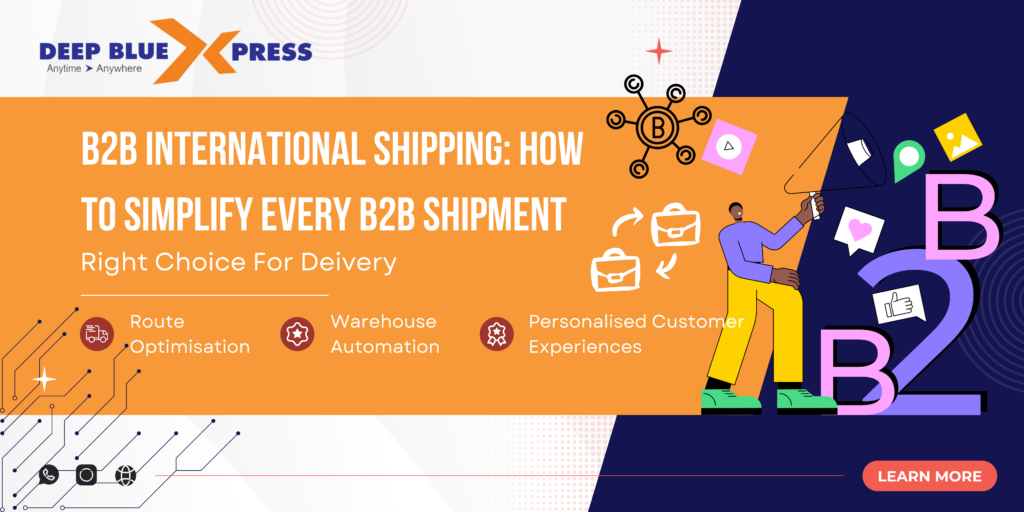When it comes to B2B eCommerce, shipping is not just simply delivering goods from one point to another; it is about coordinating a myriad of carriers, customs, and duties, as well as costs and delivery schedules, to make products arrive at the receival point on time and are in good condition and cost less to own. Regardless of the fact that numerous B2B companies are striving for the international market, the problems with shipping are magnified in this case. However, managing all of these can be a nightmare, but when all are in synergy, through unique integrations and tools, everything is made easy, from shipment and order processing to recipient satisfaction.
The Importance of B2B International Shipping and Handling Integrations
Contrary to B2C (business-to-consumer) shipping in which carefully packed items are shipped from warehouses directly to consumers using a few large carriers such as FedEx, UPS, or the US Post Office, B2B shipping is a lot more complicated. As applies to shipment of goods between business entities, products may be transported through rail, airlines, sea, and road using both a single and different transporters to the final consumer. Combine international borders, customs and different tax laws with it and what you get is a logistical challenge which requires a lot of finesse. Deep Blue Xpress is one of the best B2B International Shipping services provider. To know more about our services, visit our website.
This is the role that shipping and handling integrations can play in that situation. To a company of B2B, these integrations provide improved functionality that helps to make the shipping process efficient. Due to issues such as international sale taxes, and customs duties and other related issues that arises when shipping, these tools are indispensable to B2B business. Let’s look at the major functionalities to which any successful shipping integration should meet.
Key Features of Effective B2B International Shipping Integrations
-
Customs and Duties Management: Customs authorities and regs, as well as the dealing with the duties, are as equally a problem as when shipping abroad. There should be an integration to perform this where all the documentation required should be drafted and all the duties to be paid calculated and effected. This also helps in the aspects of faster shipping but equally reduces the chances of being held up at the customs.
-
Sales Tax Calculation: Another challenge that is strategic in B2B transactions is transnational transactions imply getting exposed to different taxes and regulatory measures. To complement a full shipping integration, it would be advisable for stores to have tools that can enable them calculate and remit sales taxes in the foreign country.
- Split-Shipping and Drop-Shipping: Some of its B2B customers need products to be dispatched to different offices; others need drop shipment services which involve dispatching products directly from the manufacturer to the buyer. A well linked system should ease these processes and provide for the handling of complex orders.
-
Multi-Carrier Support: Due to the fact that the requirements for shipment of business-to-business products are manifold; it is rarely possible to depend on a single carrier company. Ideally, any strong B2B International Shipping feature should work in harmony with other carriers in order to be able to select the optimal cost and quality shipment service for each part of the shipment. Your choice of platform should be able to incorporate air freight services as well as sea freight services and ground transportation services.
-
Real-Time Tracking and Visibility: The whereabouts of your shipment is the important knowledge you would ever want to have in the B2B business. Integrated shipping solutions should include visibility and tracking capability so as to enable the monitoring of the shipment process and give a head start on any problem that may be experienced.
-
Inventory and Storage Management: Sometimes products require storage before the next carrier takes them, or sometimes the schedules do not match, and the product has to wait in store. This is where all your integration of shipping should be accompanied by some of the aspects that help you in control of stock and arrange where the products will be stocked so as to be safe and prepared to be shipped most often.
Being a complex activity involved in international business, B2B International Shipping doesn’t have to be a logistics nightmare. They ought to tie up the perfect shipping and handling integrations to keep even the most complicated shipments on the right track and ship the products on time every single time that a customer is expecting them. One of the standard benefits of automation is better customer satisfaction because time-consuming tasks like customs management, tax calculations, and multiple carriers’ management are clogged.
In finding the shipping integration solution for your B2B company you should consider having the following features. The right solution will enable you to deal with your shipping needs in one place; this will ease the logistical operations to enable you to concentrate on the core business.
To sum up, B2B International Shipping at an international level is not something that can be easily overlooked, but with solutions and connections in place, it may be an easy process that contributes to the goals of businesses that are operating on an international level. So no matter if your B2B shipment is localized within the country or go global, you need to ensure your B2B International Shipping strategy is based on intelligent and integrated systems.
Overall, there is no doubt that B2B International Shipping is not easy, but it doesn’t have to be a difficult process and, with the help of implementation of useful relevant tool and integrations, your shipping will become a smooth process that aligns with your business goals.




